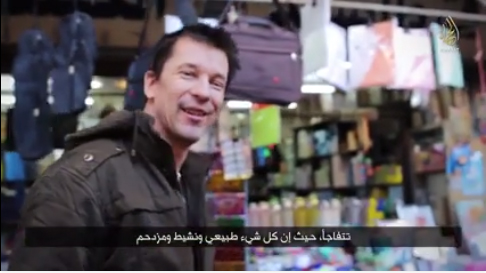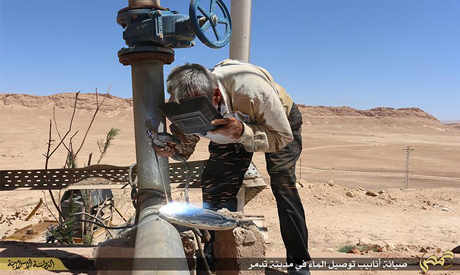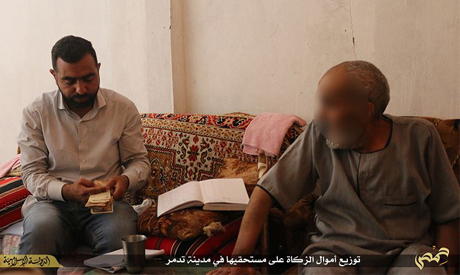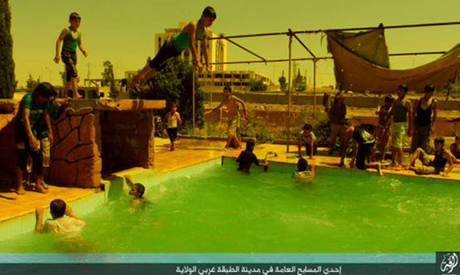A year has passed since the Islamic State (IS) announced its "caliphate" in Mesopotamia.
IS has managed to seize large swaths of both Syria and Iraq since June 2014. It gradually took control of roughly 60% of Syria and one-third of Iraqi lands.
IS – led by Abu Bakr Al-Baghdadi — counts on violent means such as execution, rape, beheadings, and forced expulsion of civilians in an aim to implement its own interpretation of Sharia (Islamic law).
The group, however, has recently sought to provide a positive image for Da'esh, the Arabic acronym of IS.
Their apparent aim is to prove that daily life within IS borders is pleasant. Photos of hotels, pools, parks, along with propaganda videos, are abundant on their social networks, in an attempt to attract more people to the IS ranks.
"The media likes to paint a picture of people's life in the IS-controlled territories as depressed, walking around in chains and beaten down by strict totalitarian rule,” said John Cantlie, 44, a British Journalist kidnapped in Syria in November 2012 by IS. The IS hostage functions as a reporter in a series of propaganda videos that document that supposed 'normal life' of IS-dominated areas.
It is still unknown whether Cantlie became ideologically pro-IS or was forced to participate in these videos.

A screenshot of British photojournalist Joun Cantlie in a video claimed to be filmed in Mousel Iraq.
Cantlie, speaking in an eight-minute propaganda video entitled “From Inside Mosul,” which was posted last December on pro-IS social media accounts, argued that the "business is working as usual" in Mosul.
He assured that life under the "IS flag" is totally different from the pictures provided by international media outlets.
In the video, Cantlie walked in streets, markets and other public places, seeking to prove his point about the stability of conditions in the northern Iraqi city. The video also showed vehicles for IS members who became Mosul's police.
However, in the last video of the series in February, Cantlie called on his family to "let it go and get on with your lives."
IS is a state, not only a militant group engaged in war, an argument that was asserted in a number of footage posted regularly on pro-IS Facebook and Twitter accounts.
Hotels, pools, and beaches

A photo posted by militants' accounts of the reopening of Ninawa Hotel in May, 2015.
IS had reopened the international five-star Ninawa Hotel in Mosul in May. It was one of many hotels that were closed by IS militants after they captured the city.
The militant group changed the hotel's name to Al-Waritheen (The Inheritors).
Only families were invited to attend the opening. Singles were banned from joining the ceremony, which the group published its photos online.
Soqor Al-Islam, a pro-IS account on Facebook, attached photos of workers fixing power plants and water pipelines in Syria's Palmyra city that fell under IS control three months ago.
"The Mujahedeen turn every village or city into a better place once it falls under IS control," Soqor Al-Islam claimed on Facebook.

Claimed photo by IS of IS service worker fixing water pipelines in Palmyra.
In a recent report, the Regional Center for Strategic Studies (RCSS) highlighted the "institutional model" used by IS militants to provide services to the people.
“They [IS] build police institutions, justice system, service bureaus and issues personal IDs and passports,” said the report.
IS—for the Cairo-based research center—is getting closer to the "semi-state" idea, pointing out that the group collects taxes and Jizya (taxes imposed on non-Muslims in accordance with Sharia) as states commonly do.
Poor people were shown in online-posted photos receiving Zakat (charity payment obligatory to every Muslim) in Mosul, the northern Syrian city of Raqqa and the Palestinian Yarmuk refugee camp in the capital Damascus.

A photo Published by Pro-IS of Poor people receiving Zakat in Palmyra.
Noomane Raboudi—a political science professor at University of Ottawa— said that IS leadership is carrying a "clear message" to the people interested in joining its ranks.
"IS wants to say that it is not only jihadist group, but a group representing a political project for the Middle East that seeks to correct the historical mistakes in the region," Raboudi said in an email interview.
On the other hand, despite the photos shows beaches, pools, and parks opening for kids, the brutal group had already beheaded and executed more than 76 children and 93 women since its declaration, according to a statement by the Syrian Observatory for Human Rights (Syriahr).

A photo published in the pro-IS websites of a publich pool in Raqqa City.
“Through 13 months of IS declaration, 3065 were killed by different methods such as beheading, stoning to death, throwing off high buildings and set hostages and prisoners on fire,” the recent published statement by the Syrian Observatory for Human Rights reported.
The statement was published on 29 July mentioned also that the group had carried out three massacres in Halab, Hamah, and Deir Ezzour where they killed more than 930 of the Sunni Shaitat tribe after they revoked their allegiance to IS.
Earlier in July, IS also released a video of children brutally executing 25 pro-Assad soldiers in the ancient ruins of Palmyra.
Unlike the Arab Spring
Over the past five years since the Arab Spring erupted, people have been waiting for justice for the old dictatorial regimes, something that has mostly not taken place. IS was the fastest alternative to convince its followers that it apply Sharia verdicts and the law of God and Islam.
An Egyptian militant –known as Amir Ata- Joined IS and is now followed by thousands on his alleged Facebook page. He wrote to his mother using the account saying, “If we leave the battlefields, Arab regimes will keep torturing its citizens and the young people will stay in prisons,” the militant said. Adding that there will be a day when the Islamic State rules the world under God’s law and every pro-IS Muslim would find revenge.
"The political environment in the Middle East is still very favorable to the growth of IS," Raboudi said. The weakness and the isolation of the Arab Sunni countries of Iraq, Syria, Yemen, and others in the Middle East makes IS seem to be almost the only credible defender of the Sunni communities in the region against the other religious and ethnic groups, Raboudi highlighted.
In a phone interview with Ahram Online, Ali Bakr— a political Islam researcher— said that the hardliners who travelled to Syria and Iraq were keen to find their Islamic “Utopia,” which they found in IS. “The more extreme you are, the more faithful you’ll be,” Bakr said, explaining militant ideology.
Abu Bakr Al-Baghdadi, who is admired by followers, is playing the ideal role of a ruler. “The Caliph is a really different person, he rules with God’s law, not like the other 'Twagheet' (or tyrants, referring to other rulers in the Middle East). He also participates in the war and in the Islamic State when you send a complaint to the Caliph, he answers them all,” a pro-IS woman who, after announcing her emigration to Syria, said to her friends on Facebook.
Despite Al-Baghdadi’s claims that he is always there for his followers, he only appeared one time in a video on 4 July 2014, days after the announcement of IS’s establishment.
The future of IS
The Central Intelligence Agency (CIA) recently issued a statement that the number of IS fighters is estimated to be between 20,000 and 31,500 fighters. The Syrian Observatory for Human Rights reported that there are 50,000 fighters, but the Kurdish provided even higher numbers, claiming 200,000 IS fighters.
IS received the Bay’ah, or the oath of allegiance to Abu Bakr al-Baghdadi, from 37 terror groups from 20 different countries around the world within one year, according to the RCSS study mentioned above.
Through manipulating their own image, the study added, IS was able to attract thousands of foreign fighters and militants from more than 80 different countries.
"The Islamic State will be a major problem in the future, it has emerged as a very large threat," said Vesna Markovic, professor of criminal justice and national security at Henry C. Lee College, University of New Haven, and a specialist in the studies of suicide bombings and financing terrorism.
Markovic explained to Ahram Online that, despite the many IS fighters being lost on the battlefield, many more are actually coming to replace them. Responding with airstrikes will not solve the problem. Air strikes may kill some major leaders, but cannot kill an ideology, she said in an e-mail interview.
Mia Bloom, professor of communication at Georgia State University, told Ahram Online that IS needs people with "advanced degrees" to maintain its ability in providing all such services, which is hard to achieve.
"IS will not become a functioning entity in the long run as it will possess only unskilled workers,” Bloom expects. She drew attention to the replacement of sciences and math with Islamic subjects in IS-controlled schools as a situation that will eventually lead to its failure in becoming a state.
As well, Bloom noted to the recent shifting of Turkey and its policy towards IS would deeply impact the group.
Turkey and the U.S. have agreed on striking IS from Turkey’s Incirlik airbase after the killing of 32 people in a suicide bombing a few weeks ago, an attack attributed to IS.
"Such agreement will limit the number of foreign fighters coming in from the west," said Bloom.
"But while Turkey has finally started airstrikes, they are simultaneously attacking the Kurdistan Workers' Party (PKK) and Kurdish People's Protection Units (YPG) targets too, thus wearing down the Kurdish opposition who are crucial to fighting IS,” Bloom added.
Moreover, Bloom emphasized that countries in the region need to realize that IS is a much greater threat to them than to the US or the West.
According to a recent report on CNN, the U.S. has launched 2,092 airstrikes against IS since announcing the coalition while all the Arab countries which engaged in the coalition only launched 108 airstrikes.
"The Arab region will have to play a bigger part in making the end of IS an eventuality," concluded Bloom.
Short link: